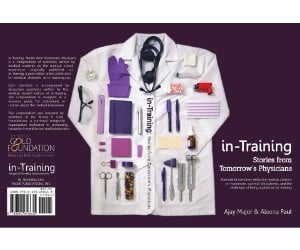Central to the skillset of every physician is the differential diagnosis; this is the process by which new patients are evaluated to establish the most likely diagnosis. Similarly, the first clinical year of medical school is like a differential for each student, except instead of a medical diagnosis, students are seeking to determine which specialty they will choose. This column explores this differential: experiences from each rotation by a current third year student.
In my first rotation, Women’s Health, I wrote about the humbling experience of helping with the birth of a child. This miracle of life is what attracts many people to the field of obstetrics, but working directly with the baby during the newborn period and throughout his/her childhood is, of course, the role of the pediatrician. As I’ve heard many times on this clerkship, “children are not simply small adults,” and understanding human development, the unique diseases of childhood, and the specific needs of young humans is often complex. For this reason, pediatrics is one of the oldest medical specialties, and remains the third largest by volume in the United States.[1]
Medical
Learn about medicine and how to become a physician in our articles for pre-medical students (including the MCAT), medical students, resident physicians, and practicing physicians.
Reclaiming a Passion
Republished with permission from here. Note: Interview conducted by medical student editor Evan Torline. Sometimes … Read more
It’s Real: The Sophomore Slump
I strolled into second year, fresh off the plane from my South American adventures and ready to hit the ground running, expecting another experience like first year. It would be smooth sailing as long as I stuck to my schedule and my friends. I was good to go. Little did I know, the “second year slump” was about to hit me like a ton of bricks. I had never before experienced such a feeling in my life—I was accustomed to challenges, pushing through whatever stood in my way, always making it through to the other side. But to be honest, few things in my prior academic experiences have challenged me as much as medical school. Before medical school, most of the challenges I faced seemed far less daunting to me than what came in the second year of medical school, even the first year of medical school. So imagine my surprise when I found myself having my first meltdown of medical school just a few weeks into my second year: Wasn’t I supposed to be good at this by now?
Advice for Interns on Night Float
Earlier this year SDN member bob123451 was the lucky intern starting residency on night float covering multiple surgery services—vascular, general, bariatrics, colorectal, and a number of subspecialties—at a community hospital. Understandably nervous about jumping in with both feet, he reached out to the SDN community for advice. The following tips may be helpful, should you find yourself in the same boat.
Is a Post-Bacc Program Right for Me? Seven Benefits to Consider
It’s important to remember that as you prepare for and apply to medical school, there isn’t one set path you must take. It’s okay if your path takes different twists and turns along the way. Increasingly, applicants are taking gap years, sometimes called bridge years, between graduating from college and applying to medical school in order to gain more medically-related experience, pay down educational debt, or prepare for the MCAT exam.
How to Balance MCAT Prep with School or Work
In an ideal world, the months before an MCAT test date would be exclusively devoted to preparing for the exam. Prospective medical students would wake each morning without any obligations outside of studying. Unfortunately, the reality for most students is that MCAT prep does not occur in a vacuum separate from other responsibilities. Instead, MCAT review occurs in the context of the typically busy life of a pre-med—taking science courses, conducting research, volunteering, and applying to medical school. Finding time to adequately prepare for your MCAT test date can be challenging, but with careful planning and the tips listed here, you can squeeze MCAT prep into your schedule.
5 Things I Wish I Knew At The Beginning of Medical School
It is not just nostalgia and excitement that grips me as I am nearing the end of medical school. A part of me is terrified at the thought of finally having to own that white coat, to be the person in charge. There is another part (though not as dominant) that is filled partly with regret. Regret over the things I didn’t do, the things I could have done differently, the moments I missed, the unnecessary anxieties…
Not “Ours” Anymore: Sharing Our Doctor Spouses
By Amy Rakowczyk
One thing is certain during medical school: your medical spouse is going to study and work a lot of hours. This is a necessary part of becoming a doctor. They need years of studying, preparing, and training in order to be able to perform the job. The time required means that you, the medical student spouse/partner, will have less time with them. There will be fewer hours when they are available. That is the hard reality.
It’s easy to start thinking about how unfair this is. You are left with gaping holes of time and are by default in charge of all the non-medical school items. You are working harder too, with less support. The unfairness of it can quickly turn into resentment and bitterness.
A Scribe Case Study: Alyssa Kettler
When did you first hear about medical scribes?
I first heard the term ‘medical scribe’ from a friend of my mother, a nurse at Fairview Hospice. She knew that I was looking for meaningful work to undertake before pursuing medical school and suggested I explore scribe opportunities. After extensive online research, I began scribe training with Elite Medical Scribes.
Book Review | in-Training: Stories from Tomorrow’s Physicians
In early 2012, medical students Ajay Major and Aleena Paul started in-Training.org, a website dedicated to the medical student community at large with a goal—according to the site—to become “the intellectual center for news, commentary, and the free expression of the medical student voice.” Since then, the site has grown by leaps and bounds, recently celebrating their 1000th article publication. Four years after the launch of the website, Major and Paul—who are now beginning their residency training—compiled around 100 of these essays into a book: in-Training: Stories from Tomorrow’s Physicians.
On Being a Medical Student
Republished with permission from here. Earlier in the summer, I was speaking with a friend … Read more
Answering The Most Common Question in Medical Education
Central to the skillset of every physician is the differential diagnosis; this is the process by which new patients are evaluated to establish the most likely diagnosis. Similarly, the first clinical year of medical school is like a differential for each student, except instead of a medical diagnosis, students are seeking to determine which specialty they will choose. This column explores this differential: experiences from each rotation by a current third year student.
Doctors-in-training have heard this question thousands of times, beginning the moment they announced their intentions to pursue a career as a physician: The question, of course, is some variant of “What kind of doctor do you want to be?” Before I interviewed for medical school, I was told to answer noncommittally; it was suggested that, if I already knew what kind of doctor I planned to become, it would imply the clinical years weren’t important to me. I was told to leave it open-ended so as not to rule any specialty out too early. I see the value in that—looking back, how could I have possibly had a good idea, given my limited clinical exposure before medical school? Even for students that do have clinical experience, it’s easy to imagine they could change their minds and, regardless, should be open to learning from the clinical years. Similarly, we were told not to answer too definitively during third year either—the idea being that if we tell an attending what we want to do, and it isn’t the specialty we are currently working with, we will be permanently alienating ourselves from that profession.
How Test Prep Prepares Me To Be An Effective Physician
Before medical school, the dream of becoming a physician involves helping people and curing disease. During medical school, that dream matures through educational and clinical experiences into a realization that being a physician is something much deeper, a permanent responsibility that only those who are doctors themselves will understand.
Every patient is a trial and error that can lead to life or death. Is the abdominal pain just constipation, a brewing appendicitis, or even worse, colon cancer? Is the patient presentation worthy of simple reassurance, or perhaps blood work, or—to be safe—diagnostic imaging?
What Students Should Know About Post-Baccalaureate Pre-Medical Programs—Part Two: SMP Students
In Part One of this series, we discussed post-baccalaureate pre-medical programs for career-changers (i.e. those who have not yet taken any of their medical school prerequisites). In this article, we will address a different kind of post-baccalaureate program—the Special Master’s Program, or SMP—that is designed for pre-medical students who need to show academic preparedness via additional coursework before applying to medical school.
Let’s face it—one of the most important components of your medical school application is your numerical data. Is your MCAT score competitive? Is your BCPM GPA strong? For many medical school hopefuls, falling short on one or more of these aspects is a frightening reality. And while studying for and retaking the MCAT is a relatively simple way to address weaknesses in your test results, remedying a low GPA can be trickier.
Managing Bipolar Disorder in Medical School
Two days before interviewing at the medical school I now attend, I couldn’t get out of bed. At the nadir of my eighth major depressive episode in eight years, I seriously considered whether I could make the trip. Thankfully, I did. And thankfully, six days after that interview I met the psychiatrist who would finally piece together my long and steadily worsening psychiatric history.
I sat in his office, quiet and dulled compared to my spring and summer self, and began recounting my story – the weightiness of my current depression, the semester in college marked by a mere two to four hours of sleep a night (“insomnia” according to my doctor then), and the clockwork nature of my mood changes each year. Within ten minutes, he stopped me mid-sentence and said, almost casually, “You know, you show a lot of signs of bipolar disorder.”
How My Research Degree Taught Me I’m Not a Surgeon
Recognizing the connection between lab work and surgery
What surprised me the most during my medical school journey was that it was primarily lab work, not my surgery rotation, that taught me I was not a surgeon. The type of experience my lab work entailed had absolutely nothing to do with surgery or clinical medicine, so it was a peculiar and fortuitous realization. I do not believe when entering medical school that I had ever thought about doing research, but our program strongly advocated it. I met with various advisors in first year and decided I was going to transition into the combined PhD program.
Expectations: Defining What You Can Expect With Your Spouse
Updated September 6, 2021. The article was updated to correct minor grammatical errors. Expectations. The … Read more
How Nontraditional Students Can Best Position Themselves When Applying to Med School
A friend of mine studied film in college and subsequently found himself working as a cameraman for a documentary television program about the lives of EMTs and ER physicians. He experienced some very tense situations, and from his work decided that he wanted to do more than document how people received medical care—his desire was to participate in the action of helping others as a doctor.
Unfortunately, his film education was the furthest possible undergrad experience he could have from pre-med. He had no applicable science credits, no anatomy or physiology, and the only shadowing he had done of physicians had been with a camera in hand. In short, his path would be an arduous one, and he was soon going to turn 31.
A Portrait of Obstetrics & Gynecology
Central to the skillset of every physician is the differential diagnosis; this is the process by which new patients are evaluated to establish the most likely diagnosis. Similarly, the first clinical year of medical school is like a differential for each student, except instead of a medical diagnosis, students are seeking to determine which specialty they will choose. This column explores this differential: experiences from each rotation by a current third year student.
Having finished my first rotation, Women’s Health Clerkship, I’d like to offer a short look into the specialty, sharing some of my observations the last few weeks. As I have said often over the past two months, I believe this was the perfect rotation to kick off third year. OB/GYNs have a wide scope of practice, and their field contains elements of many other specialties. During this rotation I was exposed to clinical medicine, by which I mean the art of seeing patients in a clinical setting, spending a few minutes with each, and using history and physical exam skills to offer a diagnosis and treatment plan. I was also exposed to surgery. I hadn’t realized just how surgical of a specialty it is, or at least can be, depending on how a doctor chooses to practice. (More on that later.) I also saw some inpatient medicine, managing patients in a hospital setting and consulting with other specialties as needed. And of course, OB/GYNs have a very unique aspect of medicine that is theirs alone: the labor & delivery floor. This breadth of practice settings was an excellent introduction to many aspects of medicine that I’m only beginning to understand.

















